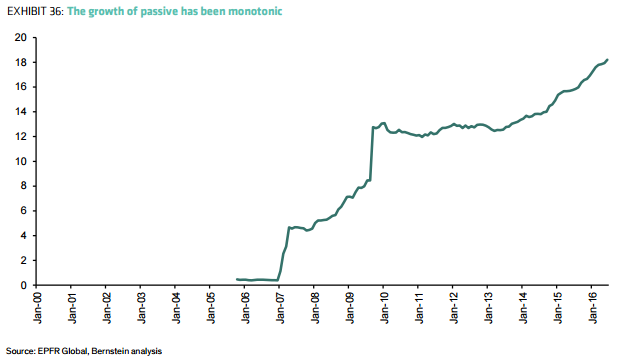Investors often weigh the pros and cons of active fund management and passive fund management. While they usually approach the issue in terms of which style will generate the highest returns, Bernstein analyst Inigo Fraser-Jenkins argues that active investment is a positive driving social force in the global economy.
The rise of passive investment has produced a major reduction in the costs of investing, and Fraser-Jenkins notes that policymakers seem to see it as a benign phenomenon. He believes that the transition to passive management is actually coming at a high cost.
“A supposedly capitalist economy where the only investment is passive is worse than either a centrally planned economy or an economy with active market led capital management,” he explains.
He even suggests that a government-planned investment program would be better than allowing passive strategies to completely take over the market.
Fraser-Jenkins argues that active management plays a critical role in providing liquidity to investors. He cites a 2016 paper by Bolla, Kohnler and Wittig that found that the rise of passive investing has increased correlation and risk within individual markets and across different markets. Among the paper’s findings is that a further one-third increase in passive investing would up correlation among U.S. stocks by 14 percent. This correlation makes it increasingly difficult to create a diversified portfolio of investments.
At this point at least, Fraser-Jenkins sees no signs that the shift to passive investment is slowing down or that the balance between active and passive investments will mean-revert on its own.

One popular theory is that the rise of passive investment will ultimately result in what Fraser-Jenkins calls an “active nirvana,” in which passive investment has created major investment opportunities for active managers. However, Fraser-Jenkins notes that it would be difficult to recognize such an opportunity in real-time.
Instead, he suggests…
Click here to continue reading
Want to learn more about how to profit off the stock market? Or maybe you just want to be able to look sophisticated in front of your coworkers when they ask you what you are reading on your Kindle, and you’d prefer to tell them “Oh, I’m just reading a book about stock market analysis,” rather than the usual “Oh, I’m just looking at pics of my ex-girlfriend on Facebook.” For these reasons and more, check out my book, Beating Wall Street with Common Sense. I don’t have a degree in finance; I have a degree in neuroscience. You don’t have to predict what stocks will do if you can predict what traders will do and be one step ahead of them. I made a 400% return in the stock market over five years using only basic principles of psychology and common sense. Beating Wall Street with Common Sense is now available on Amazon, and tradingcommonsense.com is always available on your local internet!


